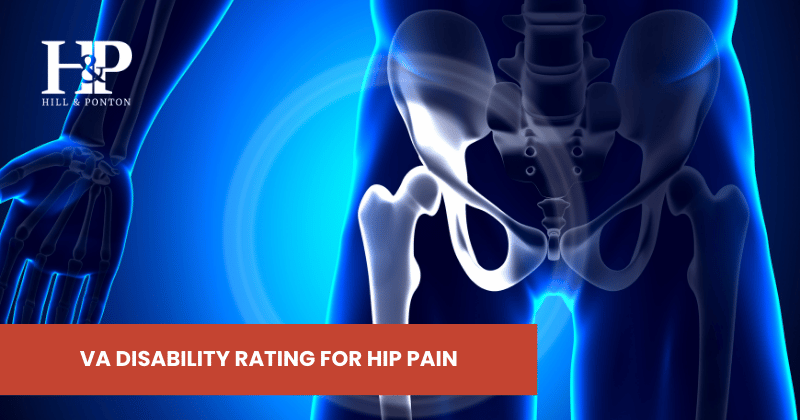Hemorrhoids are a common yet painful condition affecting many veterans, often because of or exacerbated by other service-connected conditions like Irritable Bowel Syndrome (IBS) and Gastroesophageal Reflux Disease (GERD). The VA recognizes and assigns ratings to both internal and external hemorrhoids.
- Internal Hemorrhoids: Located inside the rectum and generally less painful but can cause bleeding.
- External Hemorrhoids: Found under the skin around the anus, causing significant pain and swelling, particularly when thrombosed (clotted).
What Is the VA Disability Rating for Hemorrhoids?
The VA rates hemorrhoids (internal and external) at 10% or 20%, using Diagnostic Code 7336:
- 20%: Internal or external hemorrhoids with persistent bleeding and anemia; or continuously prolapsed internal hemorrhoids with three or more episodes per year of thrombosis
- 10%: Prolapsed internal hemorrhoids with two or less episodes per year of thrombosis; or external hemorrhoids with three or more episodes per year of thrombosis
Update as of March 2024: VA has revised its rating criteria for hemorrhoids under the updated VA Schedule for Rating Disabilities (VASRD). Now, mild or moderate hemorrhoids qualify for a 10% evaluation. Previously, these conditions would not have qualified for compensation unless they were large, thrombotic, or caused severe complications. This change reflects the VA’s acknowledgment of the significant impact that even mild or moderate hemorrhoids can have on a veteran’s quality of life.
Maximize Your Benefits
Unhappy with your VA decision? We’re here to help. Contact us for a free review of your case.
Winning a 30% VA Disability Rating for Hemorrhoids Post-Hemorrhoidectomy: Case Example
In this case, a veteran who served in the U.S. military from June 1966 to May 1967 and from June 1967 to May 1970 filed a claim for disability benefits due to hemorrhoids post-hemorrhoidectomy with impairment of sphincter control. Initially, the veteran received a non-compensable (0%) disability rating but believed his symptoms were more severe than reflected in the rating. After appealing the decision, the Board of Veterans’ Appeals reviewed the evidence.
The Board ultimately decided to increase the disability rating to 30% for hemorrhoids post-hemorrhoidectomy with impairment of sphincter control, effective from April 1, 2001. This decision was based on medical evidence showing the veteran’s occasional involuntary bowel movements necessitating the wearing of a pad, which met the criteria for a 30% disability rating under Diagnostic Code 7332.
How This Claim Was Won
- Detailed Medical Evidence: The veteran’s case was strongly supported by comprehensive medical records, including VA examination reports and private healthcare provider notes. These records documented the severity and persistence of the veteran’s hemorrhoids and related symptoms over time.
- Consistent Symptom Documentation: Throughout the appeal process, the veteran consistently reported symptoms such as rectal bleeding, pain, and occasional involuntary bowel movements. This continuous documentation was vital in establishing the severity of the condition.
- Thorough VA Examination: VA examinations, including those conducted in February 2001 and November 2006, provided objective evidence of the veteran’s condition. These examinations were crucial in supporting the claim for a higher disability rating.
This case highlights the importance of thorough medical documentation, consistent symptom reporting, and effective legal representation in successfully appealing a VA disability rating.
Hemorrhoids Secondary to GERD
Gastroesophageal Reflux Disease (GERD) can be related to the development of hemorrhoids, particularly due to the strain GERD places on the gastrointestinal system. While GERD primarily affects the upper digestive tract, the resulting discomfort and straining during bowel movements can lead to hemorrhoids.
Establishing a secondary connection for hemorrhoids related to GERD requires medical evidence that links the two conditions. Veterans suffering from GERD who develop hemorrhoids due to increased straining or other related factors may qualify for a secondary service connection.
Get Help With Your VA Disability Claim
Hemorrhoids Secondary to IBS
Irritable Bowel Syndrome (IBS) is a chronic condition that affects the large intestine, leading to symptoms such as abdominal pain, cramping, bloating, and irregular bowel movements, including diarrhea and constipation. The straining and irregular bowel movements associated with IBS can lead to the development of hemorrhoids or worsen existing ones.
The VA disability rating for hemorrhoids secondary to IBS is 10% or 20%, and establishing the secondary service connection will require a medical nexus — a statement from a healthcare provider linking the hemorrhoids to the veteran’s IBS.
In a recent case, a veteran with service-connected IBS developed hemorrhoids as a secondary condition. The veteran’s medical records showed a clear connection between the IBS-related bowel irregularities and the development of hemorrhoids.
Getting VA Disability for Hemorrhoids Secondary to IBS: A Winning Case Example
In this case, a veteran who served in the U.S. military from November 1996 to August 2000 filed a claim for secondary service connection for hemorrhoids, arguing that the condition was secondary to her service-connected IBS. The claim was initially denied, but after appealing the decision, the Board of Veterans’ Appeals reviewed the evidence.
The Board ultimately granted service connection for hemorrhoids as secondary to IBS, recognizing that the veteran’s hemorrhoids were proximately due to or the result of her service-connected Irritable Bowel Syndrome. This decision was based on medical evidence showing that the veteran’s IBS symptoms, including frequent diarrhea and constipation, directly contributed to the development of hemorrhoids.
How This Claim Was Won
- Detailed Medical Evidence: The veteran’s case was supported by comprehensive medical records, including VA examination reports and private healthcare provider notes. These records documented the veteran’s history of IBS and its symptoms, which included alternating diarrhea and constipation. A January 2009 VA examination noted an increase in hemorrhoidal flares as a symptom of her IBS, further establishing the connection between the two conditions.
- Private Medical Opinions: The veteran provided statements from private medical providers, including a 2012 assessment from Digestive Disorders Associates, which recommended surgical excision of the hemorrhoids and treatment for her IBS-related constipation. These opinions supported the claim that the veteran’s hemorrhoids were aggravated by her IBS.
- Consistent Symptom Documentation: The veteran consistently reported symptoms related to both IBS and hemorrhoids throughout her appeal, ensuring a continuous and clear record of the impact of IBS on her hemorrhoid condition. Personal statements, including one from the veteran’s sister, provided additional evidence of the daily challenges the veteran faced due to her conditions.
- Veteran Testimony: During a February 2016 Board hearing, the veteran testified about her severe IBS symptoms and their role in exacerbating her hemorrhoids. Her detailed testimony added a compelling narrative to the case, reinforcing the medical evidence.
Making a Successful VA Disability Claim for Hemorrhoids
When filing a VA claim for hemorrhoids, whether as a primary or secondary condition, veterans should consider the following:
- Comprehensive Medical Documentation: Provide detailed medical records that document the severity and frequency of your hemorrhoid symptoms, including any complications such as persistent bleeding, anemia, or fissures.
- Symptom Diary: Keeping a daily log of symptoms can be helpful in demonstrating the impact of hemorrhoids on your daily life.
- Seek Medical Opinions: A statement from your healthcare provider linking your hemorrhoids to your service-connected condition (such as IBS or GERD) is crucial for establishing a secondary service connection.
If your hemorrhoids were caused or aggravated by the military service and the VA has denied or underrated you, reach out for a free case evaluation.




